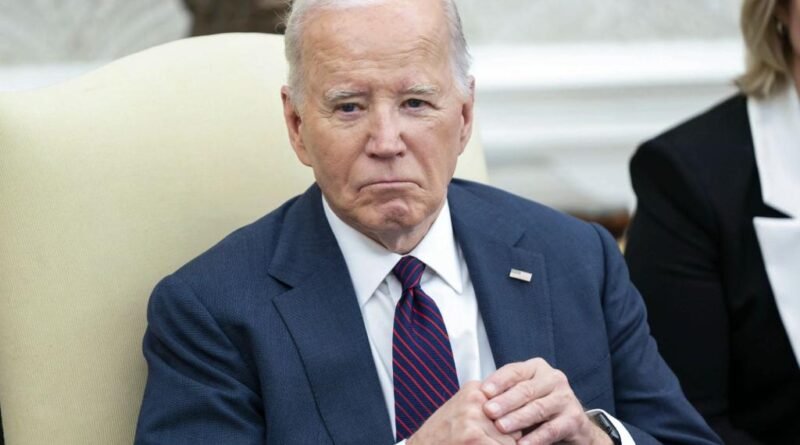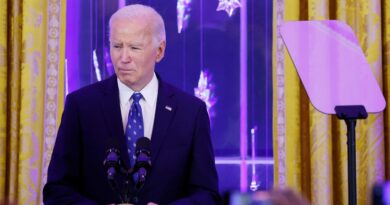Biden Urges Allies to Exercise Restraint: Analysis of the Current Middle East Conflict and Other Commentary

Foreign desk: Why Biden Urges Allies’ Restraint
President Biden is “always telling his friends to hold back, at least internationally,” fumes National Review’s Jim Geraghty.
Iran struck Israel on Saturday, and “by Sunday morning, the Biden team was urging Israel to declare . . . that the fight was over.”
That’s similar to the administration’s “belief that the Ukrainians should win the war” — but not by “using any method that might damage Russian oil refineries.”
Team Biden lacks “influence over the actions of Iran, Hamas, the Houthis, Russia . . . or any other hostile actor or state.
But it does have some influence over the Israelis, Ukrainians, and other friends and allies. So, all of our efforts to ‘deescalate’ amount to telling our friends to not hit back after they’ve been hit.”
View from Jerusalem: The Real Mideast War
“After a night of tension” in Jerusalem, including “family time spent in the safe room,” the direct consequences of Iran’s attack on Israel aren’t yet clear, but the strike finally gave the world “a glimpse of the real war in the Middle East,” reports Matti Friedman at The Free Press.
The Jewish state’s enemies have portrayed its war against Hamas as one pitting Israeli soldiers against Palestinian civilians.
But it’s really just part of a century-old “Arab-Muslim war” against Jews, in which “most of the combatants on the Arab side haven’t been Palestinian” and some of the Jewish victims (like those killed in Iran’s 1994 attack on a Jewish center in Argentina) haven’t been Israeli.
“For the first time,” Iran’s barrage demonstrated the real “scope” of the war.
Education beat: SATs Make a Return
“For decades the SAT or the ACT was a nonnegotiable part of the college application process,” yet during the pandemic, “colleges moved to a test-optional admissions process,” recalls the Washington Examiner’s editorial board.
Even after the crisis, schools like Harvard, Yale and MIT “continued to operate on a test-optional admissions model,” arguing that “standardized tests are racist because, on average, certain demographics tend to do better on the SAT and ACT than others.”
Yet now, “many of these colleges” have realized the tests’ importance and “are crawling back to their pre-pandemic practice of requiring standardized test scores.”
In so doing, they’re “eschewing the bigotry undergirding the anti-test movement.”
Democrat: Fellow Dems Must Help GOP Speaker
“Ukraine faces a new Russian offensive with insufficient ammunition,” laments Rep. Tom Suozzi at The Wall Street Journal following his recent visit to Kyiv, Poland and Moldova.
On social media, his trip was slapped with “a flood of hostility and [Russian] propaganda.”
In Washington, he “was greeted by Rep. Marjorie Taylor Greene’s newest threats to remove [GOP] Speaker Mike Johnson if he brings to the floor a bill to aid Ukraine.”
Leading Republicans say “Greene is parroting Russia’s propaganda.”
Yet Moscow aims to rupture “international order,” “destroy the North Atlantic Treaty Organization” and end “the era of American-style democracy.”
“Democrats must offer Speaker Johnson our votes to save democracy in Ukraine and here” and “get a vote to support Ukraine, and defeat Russian disinformation.”
From the right: The Joe-vs.-Don Calculus
We’ve “seen enough of the Biden-Trump race so far to predict what lies ahead,” argues Victor Davis Hanson at American Greatness.
“Biden has three major vulnerabilities”: “mental and physical decline,” his family’s corruption and the fact that “the hard-left Biden agenda is completely underwater.”
Trump “lacks incumbency,” “does not have an army of officials on his side” and also faces “a financial disadvantage.”
“Can Trump convince millions of minorities, independents, and former Biden voters” to back him?
“Will Biden’s feebleness still earn him sympathy”? “The polls are about dead even. Trump, however, for now enjoys small leads in the majority” of swing states.
But “the outcome of the election could be determined by unpredictable events” in the Middle East and elsewhere.
— Compiled by The Post Editorial Board



